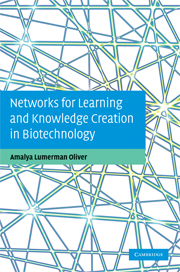Book contents
- Frontmatter
- Contents
- List of figures
- List of tables
- Acknowledgements
- Introduction
- 1 Networks, collaborations, and learning and knowledge creation
- 2 The biotechnology industry through the lenses of organizational and networks scholarship
- 3 New organizational forms for knowledge creation in biotechnology
- 4 Scientific entrepreneurship
- 5 Science and discoveries in the context of private and public knowledge creation and learning
- 6 The search for university–industry collaborations: linear and chaotic networking processes
- 7 Trust in collaborations and the social structure of academic research
- 8 Organizational learning and strategic alliances: recombination and duality of competition and collaboration
- 9 Further directions for understanding interorganizational collaborations and learning
- References
- Index
5 - Science and discoveries in the context of private and public knowledge creation and learning
Published online by Cambridge University Press: 04 July 2009
- Frontmatter
- Contents
- List of figures
- List of tables
- Acknowledgements
- Introduction
- 1 Networks, collaborations, and learning and knowledge creation
- 2 The biotechnology industry through the lenses of organizational and networks scholarship
- 3 New organizational forms for knowledge creation in biotechnology
- 4 Scientific entrepreneurship
- 5 Science and discoveries in the context of private and public knowledge creation and learning
- 6 The search for university–industry collaborations: linear and chaotic networking processes
- 7 Trust in collaborations and the social structure of academic research
- 8 Organizational learning and strategic alliances: recombination and duality of competition and collaboration
- 9 Further directions for understanding interorganizational collaborations and learning
- References
- Index
Summary
Issues of knowledge creation, discoveries, and inventions, as well as scientific entrepreneurship, are embedded in the institutional environment. Universities, scientists, and networks of collaboration are shaped to a great degree by the norms and regulations of the institutional environment in which they operate.
In this chapter, we explore the effects of institutional context on the conduct and on the outcomes of scientific research through the lens of property rights arrangements. Using the example of the allocation of property rights of two breakthrough inventions in biotechnology, we ask whether the absence of narrowly defined property rights in these two inventions was a deterrent to the development of subsequent property rights in commercially valuable new inventions that employed them. In conjunction with this question, we open up new questions about the relationship between institutional policies regarding intellectual property rights and the progress and direction of academic research.
Introduction
For the past 30 years, there has been a steep increase in patenting activity by US universities and other publicly funded research institutes such as the National Institutes of Health (Eisenberg 1996; Henderson, Jaffe & Trajtenberg, 1998; Mowery et al. 2001; Owen-Smith 2003; Rothaermel, Agung & Jiang 2007).
- Type
- Chapter
- Information
- Networks for Learning and Knowledge Creation in Biotechnology , pp. 115 - 139Publisher: Cambridge University PressPrint publication year: 2009
- 2
- Cited by



